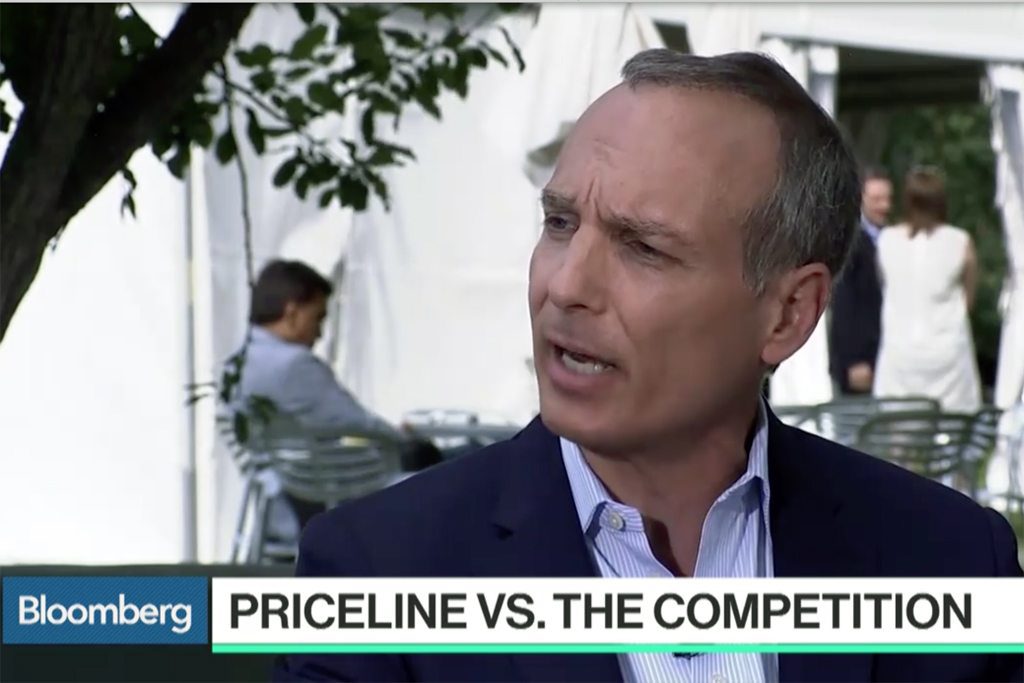Skift Take
Priceline CEO Glenn Fogel says he wants travelers to think of Booking.com's name first when they start thinking about reserving homes and apartments for rental. He says a marketing effort is in the works to achieve that.
Priceline Group expects to be a fast-growing company over the next few years, but that it is despite some hotel lobbying efforts which CEO Glenn Fogel characterized as a sideshow.
Interviewed on Bloomberg TV outside of the Fortune Brainstorm Tech 2017 conference in Aspen, Colorado, which was broadcast Wednesday, Fogel draws a distinction between a hotel lobbying group and hotels themselves, which he implied liked Priceline Group practices just as they are.
Fogel says, “I’ve read some very nice things from some of the CEOs of hotel groups saying, ‘I’m not exactly sure where [the charges of oligopoly] came from.'”
The chief executive does not elaborate on where he read these written comments.
Fogel also echoes an argument he made during his company’s most recent earnings call that his portfolio of companies collectively only offer to consumers a single-digit percentage of the world’s hotels and vacation rentals. (In the past, Priceline and its competitor Expedia Inc. have each said they only have about 5 percent of the world’s travel inventory on their platforms.)
By that logic, it’s impossible that Priceline Group could be a monopoly, he says.
“People who say we have some sort of large market share should look at the statistics,” he adds.
His remarks come in the wake of news in May that the American Hotel & Lodging Association, a trade lobby that counts Hilton Worldwide, Hyatt, and Marriott International, as members, plans to step up a campaign to warn regulators and elected officials of so-called monopolistic tendencies by online travel agencies.
Priceline Group has the largest revenue and market capitalization of the online travel groups worldwide, so it potentially could be affected the most by such a campaign.
Not afraid of Airbnb competition
In other matters, Fogel said that he’s always on the alert for new competitors to possibly steal his company’s market share. He says Priceline Group has experience at surprising other companies and stealing market share, such as with the rise of Booking.com’s success.
“We are used to coming out and undercutting bigger people, so I am aware that players much smaller than us who are coming up quickly. We watch what they’re doing.”
Fogel ignores talk about reports that Airbnb is building a flight search engine, focusing instead on noting that his company is managing the Airbnb threat by building out its rentals and vacation home product.
“I believe that the ability to see homes, apartments, and villas in the same search results as hotels is powerful,” Fogel says, noting that 100 percent of the company’s more than 700,000 listings are “instantly bookable,” something that rival online travel players can’t claim yet.
Fogel won’t reveal the type of marketing campaign he plans. But he says he wants travelers — especially Americans — to think of Booking.com’s name first when they start thinking about booking homes and apartments for rental. He says a marketing effort is in the works to achieve that.
In response to a question about Google possibly having to make changes to its search results in Europe in response to concerns by European watchdogs. Fogel says he isn’t worried about the changes. He compared Priceline Group to being like “a wingman for a pilot,” with Google being the pilot. He says his company has hundreds of engineers that can quickly adapt to any changes Google makes.
Fogel adds, “If you’re a small player, you don’t have the luxury of having those technical people [to adapt to changes by Google].”
The Daily Newsletter
Our daily coverage of the global travel industry. Written by editors and analysts from across Skift’s brands.
Have a confidential tip for Skift? Get in touch
Photo credit: CEO Glenn Fogel says he's not worried about hotel lobby group claims that the fees of online travel agencies are excessive relative to the value provided. He spoke with Bloomberg's Emily Chang outside of the Fortune Brainstorm Tech 2017 conference in Aspen, Colorado. Bloomberg
